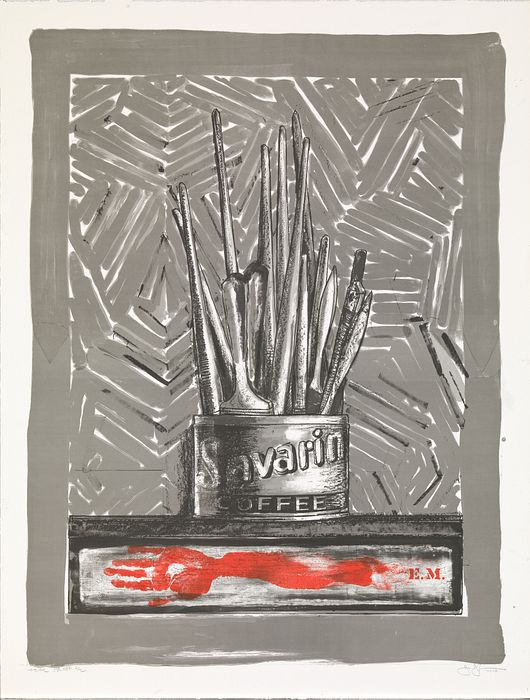14 July - 5 November 2017

https://www.staatsgalerie.de/en/press/great-graphic-boom-engl/sgs.html
Printmaking had previously served primarily to make religious or political content accessible to a broad public and as an important means communication in other areas as well. In the early twentieth century it was above all the German Expressionists who devoted themselves to this technique quite extensively. Decades later, in the late 1950s, the U.S. then experienced a veritable “graphic boom”.
At this point in time, the most prominent artists of the American avant-garde – exponents of Abstract Expressionism, Hard Edge, Pop Art, Minimal Art and other currents – began experimenting and working with a wide variety of printmaking techniques.
Publishing companies specializing in printmaking – for example Universal Limited Art Editions (ULAE) in New York, founded by Tatyana Grosman in 1957, or GEMINI G.E.L (Graphic Editions Limited) in Los Angeles, established in 1966 – played a special role, owing above all to the high standards they set for graphic art. Individual sheets, portfolios and artists’ books were produced in great numbers. Especially the Pop artists used printmaking as a means of responding to industrial mass production and the advertising language of the media.
The majority of the artists had already made names for themselves as painters. At the same time – following in the footprints of the pioneers of modern graphic art such as Paul Gaugin, Edvard Munch and Pablo Picasso – they employed above all lithography and screen printing, but also other printmaking techniques, to arrive at individual artistic formulations.
The exhibition will feature some 170 sheets offering impressively broad insight into the styles and manifestations of American printmaking and its establishment as an independent art form.
Organized by the Staatsgalerie Stuttgart in collaboration with the Nasjonalmuseet Oslo.
Works by 23 artists, both well-known and less familiar, are on display. Featured attractions include
Barnett Newman 1905-1970Series of eighteen lithographs of various sizes
Presented by Mrs Annalee Newman 1972
Tate Gallery,
Barnett Newman's major Cantos series (1964)
and Agnes Martin's On a Clear Day (1973), as well as Robert Rauschenberg's use of found objects and Jasper Johns's reworking of mundane subject matter such as flags and letters. Lithography and silk-screen prints were the media of choice for many artists, while Helen Frankenthaler, Donald Judd, and Brice Marden explored older techniques such as woodcuts and etching.
Roy Lichtenstein's famous Brushstroke is a natural inclusion here, as are
Staatsgalerie Stuttgart, Graphische Sammlung, Leihgabe 1968 Kultusministerium Baden-Württemberg, © 2017 The Andy Warhol Foundation for the Visual Arts,
Andy Warhol's portraits of Elizabeth Taylor and Jackie Kennedy. Other highlights include Warhol's Campbell's soup cans
and Louise Bourgeois's Ste Sebastienne.
Artists represented:
Willem de Kooning (1904–1997), Barnett Newman (1905–1970), Louise Bourgeois (1911–2010), Agnes Martin (1912–2004), Jackson Pollock (1912–1956), Robert Motherwell (1915–1991), Sam Francis (1923–1994), Ellsworth Kelly (1923–2015), Roy Lichtenstein (1923–1997), Robert Rauschenberg (1925–2008), Helen Frankenthaler (1928–2011), Robert Indiana (*1928), Donald Judd (1928–1994), Cy Twombly (1928–2011), Andy Warhol (1928–1987), Jasper Johns (*1930), Lee Bontecou (*1931), John Baldessari (* 1931), Frank Stella (*1936), Ed Ruscha (*1937), Richard Serra (*1939), Bruce Nauman (*1941)
Sam Francis, The White Line (Die weiße Linie), 1960, Farblithographie auf elfenbeinfarbenem Papier, 90,5 x 63 cm, Staatsgalerie Stuttgart,

























